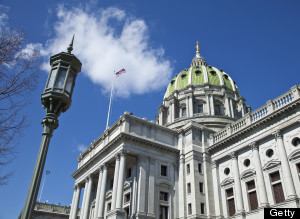HARRISBURG, Pa. — A state judge issued an order Friday that is expected to block enforcement of Pennsylvania's strict voter-identification law in the Nov. 5 general election.
Local poll workers can ask voters to show IDs if they have them and distribute written material about the law, but they may not tell voters at the polls that photo IDs could be required in future elections, Commonwealth Court Judge Bernard McGinley said.
"There is no value in inaccurate information, and the court does not deem inaccurate information `educational.' It is not a matter of confusion – it is a matter of accuracy," McGinley wrote.
McGinley's ruling marked the third consecutive election in which enforcement of the law has been blocked by court order.
After legal jousting that reached the state Supreme Court, a judge blocked enforcement in last year's presidential election and again in this year's municipal and judicial primary because of lingering concern that it could disenfranchise voters who lacked a valid photo ID.
The preliminary injunction will remain in effect until McGinley decides the case and rules on a request for a permanent injunction. Although his order does not mention the Nov. 5 election, both sides in the case sought to block enforcement of the law in that election.
"The intention certainly was that it would last through November," said Jennifer Clarke, director of the Public Interest Law Center of Philadelphia who is helping represent plaintiffs seeking to overturn the law.
The constitutionality of the law is being challenged and was the subject of a 12-day trial before McGinley that ended this month.
The plaintiffs – the NAACP, the Pennsylvania League of Women Voters and Philadelphia's Homeless Advocacy Project – emphasized problems in distributing a new voting-only ID card available for free to voters without other acceptable IDs. They said dozens of registered voters who applied for the cards before last year's election did not receive them before the election.
Lawyers for the state defended the law, arguing that last year's multimillion-dollar publicity campaign and the refinement of the special voting-only card by the Pennsylvania Department of State ensured that any registered voter who lacks an appropriate ID can now get one.
The 2012 law was approved without any Democratic votes by the Legislature's Republican majority and signed by GOP Gov. Tom Corbett amid a bitterly contested White House race in which Democratic President Barack Obama ultimately carried Pennsylvania.
Critics derided the law as a cynical GOP effort to discourage voting by young adults, minorities, the elderly, poor and disabled from going to the polls. Republicans said most Pennsylvanians have driver's licenses to use as photo ID and claimed that the law would discourage voter fraud. Democrats have said there is little evidence of such fraud.
Original Article
Source: huffingtonpost.com
Author: PETER JACKSON
Local poll workers can ask voters to show IDs if they have them and distribute written material about the law, but they may not tell voters at the polls that photo IDs could be required in future elections, Commonwealth Court Judge Bernard McGinley said.
"There is no value in inaccurate information, and the court does not deem inaccurate information `educational.' It is not a matter of confusion – it is a matter of accuracy," McGinley wrote.
McGinley's ruling marked the third consecutive election in which enforcement of the law has been blocked by court order.
After legal jousting that reached the state Supreme Court, a judge blocked enforcement in last year's presidential election and again in this year's municipal and judicial primary because of lingering concern that it could disenfranchise voters who lacked a valid photo ID.
The preliminary injunction will remain in effect until McGinley decides the case and rules on a request for a permanent injunction. Although his order does not mention the Nov. 5 election, both sides in the case sought to block enforcement of the law in that election.
"The intention certainly was that it would last through November," said Jennifer Clarke, director of the Public Interest Law Center of Philadelphia who is helping represent plaintiffs seeking to overturn the law.
The constitutionality of the law is being challenged and was the subject of a 12-day trial before McGinley that ended this month.
The plaintiffs – the NAACP, the Pennsylvania League of Women Voters and Philadelphia's Homeless Advocacy Project – emphasized problems in distributing a new voting-only ID card available for free to voters without other acceptable IDs. They said dozens of registered voters who applied for the cards before last year's election did not receive them before the election.
Lawyers for the state defended the law, arguing that last year's multimillion-dollar publicity campaign and the refinement of the special voting-only card by the Pennsylvania Department of State ensured that any registered voter who lacks an appropriate ID can now get one.
The 2012 law was approved without any Democratic votes by the Legislature's Republican majority and signed by GOP Gov. Tom Corbett amid a bitterly contested White House race in which Democratic President Barack Obama ultimately carried Pennsylvania.
Critics derided the law as a cynical GOP effort to discourage voting by young adults, minorities, the elderly, poor and disabled from going to the polls. Republicans said most Pennsylvanians have driver's licenses to use as photo ID and claimed that the law would discourage voter fraud. Democrats have said there is little evidence of such fraud.
Original Article
Source: huffingtonpost.com
Author: PETER JACKSON

No comments:
Post a Comment